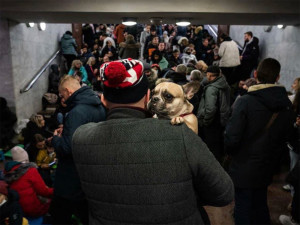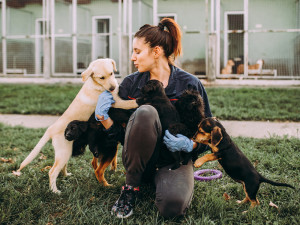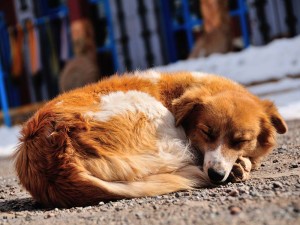Australian Vet Dr. Lachlan Campbell on Saving Animals in Ukraine
Bombs, mines, and military checkpoints won’t stop him from evacuating animals from Irpin and running a pop-up vet clinic in Lviv for refugees and their pets.
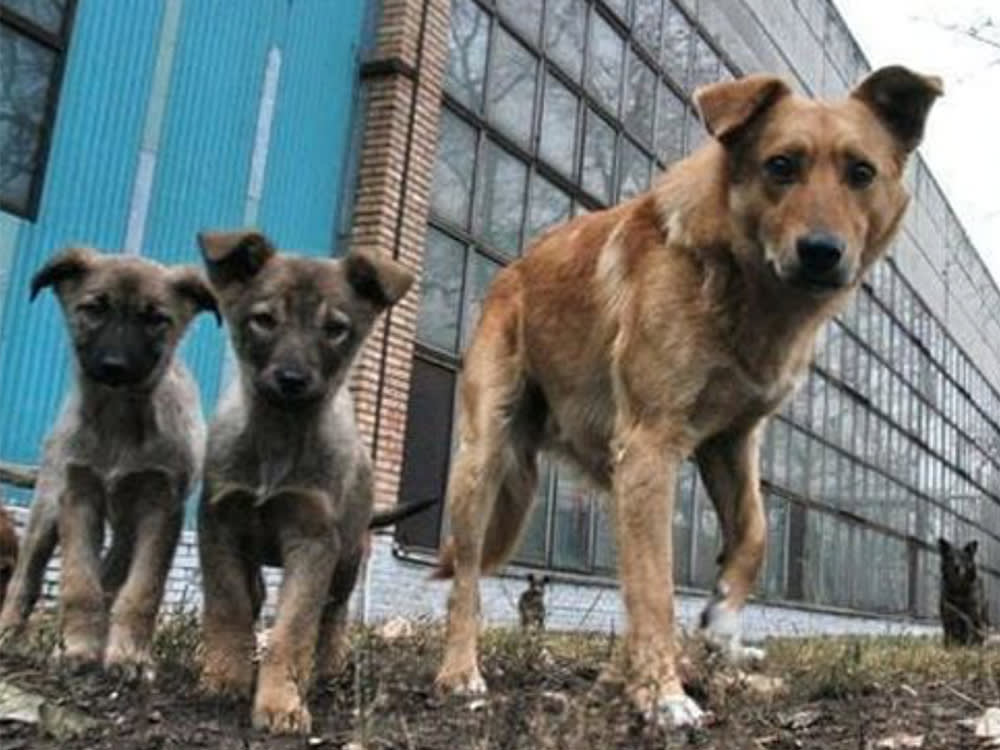
Share Article
When Dr. Lachlan Campbell first saw the Russian attacks on Ukraine, he felt what most of us did — pure horror. But he soon turned his attention to those who were under-represented in the coverage. “I noticed many animals being carried by refugees and wondered who was there to help.” The Australia-based veterinarian knew he had the tools to help and quickly decided he couldn’t stand by and watch — he needed to act.
Within a few days, he had booked a flight to Poland to help aid at the Ukrainian border, providing treatment and supplies to animals displaced by war. However, once there, he felt compelled to do even more and began trekking in and out of the active war zone to rescue stranded animals. He’s also started a GoFundMeopens in new tab page that has raised over $80,000 to help the cause. Dr. Campbell recently took a short break from his life-saving work to talk to us about his experience on the front lines of a war zone.
Please tell me a little bit about yourself and your decision to leave home to help the animals of Ukraine.
I have been a practicing veterinarian for 13 years. I live on the Sunshine Coast in Queensland, Australia with my young family — daughter Penny, son William, and wife Richelle, who is also a vet. We also have three dogs: Euka, Pip, and Edna. Typical family life picking kids up from school, working, and spending a lot of time at the beach. I have no connection with Ukraine at all. Like many of us, I had seen the horrific scenes on the news. I noticed many animals being carried by refugees and wondered who was there to help.
After some thought, I realized I could help. I had the experience and the skills; I just needed to make it happen. Decisions were made and flights were booked literally within a couple of days. My wife, who understands me well, knew it was something I needed to do and has been extremely supportive.

What were your early experiences when you got to the Polish-Ukraine border?
My initial plan was to spend the majority of time on the border assisting animals which were brought over by refugees and rescuers coming from Ukraine. I assured my wife I was unlikely to enter Ukraine itself. I soon realized I could do more by entering Ukraine and helping on the coalface.
My initial experience was working with local charities such as The Lower Silesian Animal Protection Inspectorateopens in new tab and The Ada Clinicopens in new tab — assisting in the diagnostic investigation and medical and welfare care to animals brought over the border. Some animals of note had been burnt by bombs; one, unable to walk, had a bullet that had to be removed from her spine. Others were riddled with parasites, severely malnourished, and dehydrated. The majority, however, were simply strays who needed care, welfare, and a loving home.
What was crossing the border back and forth like?
Entering a country at war was surreal. Driving through military checkpoints, staying in locations, and not being able to turn on lights at night due to bombing concerns, hearing far away explosions, experiencing air-raid sirens, and having to go down into bunkers are not something I’d ever anticipated doing in my life.
Delivering food, blankets, and much-needed medical supplies to shelters in Ukraine overloaded with animals coming from the front line. Running a pop-up veterinary clinic in a University in Lviv which housed 800 refugees and their pets (dogs, cats, and some reptiles/birds). They were so grateful for my help and lined up to wait for my consultation.
I received special military approval to enter Irpin, (a city north of Kyiv which the Russians had only just been pushed out ofopens in new tab) to provide care and/or evacuate animals in need there. We had a briefing from the Ukrainian military to be very careful because unexploded ordinances were present (we saw them half stuck in the ground). The Russians had also mined the area. Only the day after did the risk more markedly hit home when the area was closed because of Russian saboteurs.
In addition to the apparent dangers of being in an active war zone, what logistical challenges and constraints did you face?
Getting to where we needed was difficult. Bridges blown and military checkpoints slowed travel significantly. A severe diesel shortage meant we needed meticulous travel plans and impacted our distance traveled. Traveling at night carried inherent risk — not only due to being unable to pass military checkpoints and get where we needed to get, but the risk of Russian attack increased dramatically.
Can you share some stories of the animals you’ve helped.
Rescuing a dogopens in new tab that had been abandoned in its pen after the owner’s house had been partially blown up by artillery and survived three to four weeks without food and water is a highlight for me. This dog was frightened, dehydrated, and malnourished, but lovely and friendly. A memorable moment for me. And h anding out teddiesopens in new tab to children during an air-raid and seeing their smiles was a welcome distraction.
Jumping fences, searching backyards, and exploring destroyed apartments for any signs of life is eerie and memorable, particularly knowing I could discover dead people. Finding, watering, and feeding goats in destroyed surroundings. Setting up a surgical suite at a shelter and training the veterinarians in ultrasonography will help them in the future. Supplying, delivering food and veterinary medications to shelters in need potentially helps hundreds of animals.
Can you speak a bit to the situation and why many animals are being overlooked as a byproduct of the war?
War affects everyone, everything. Pets are an integral part of family life all over the world. War is so horrific people are forced to prioritize — and justifiably so — themselves and their human families for survival. Animals are, unfortunately, an afterthought to many when they see their friends or family killed, their life is at risk, or their house is bombed.
As of this writing, you’ve raised over $80,000 on GoFundMe to help the animals of Ukraine. Has this response met or exceeded your expectations?
This has far exceeded my expectations. My initial plan was to fund this trip completely on my own. When I told family and friends what I was doing, they asked me what they could do to help the cause. That’s when I started the GoFundMe page. I am honored that hundreds of people have donated their money to support the cause. I feel a great sense of responsibility to ensure their donations are spent judiciously and directly help animals affected by this war.
What has the overall response been to your work outside of the GoFundMe page, especially with news networks picking up the story?
The response has been overwhelmingly supportive of what I have been doing. I must admit that I am not typically someone to promote what I do, but I know this is bigger than me and the more I do, the more I can help these animals in need.
Beyond donating to the GoFundMe, are there any other ways people can help out? Any other organizations they should support?
Support the country and the people of Ukraine every chance they get. What they are experiencing is horrific and they need our support. People can support foundations such as The Lower Silesian Animal Protection Inspectorateopens in new tab, The Ada Clinicopens in new tab, or Nowzadopens in new tab, all of which I have worked with and I now trust and see the good they do. They are doing a fantastic job helping animals in Ukraine affected by the war.
Anything else you’d like to add?
I am so proud and honored to have received the support of so many and wish to continue to help this cause long-term. I have developed trusted contacts and solid supply lines to the front line. I am confident the donations I have received reach those animals in dire need. It is likely I will return to Ukraine in the near future to continue our work. I say our thanks to all those who have donated.
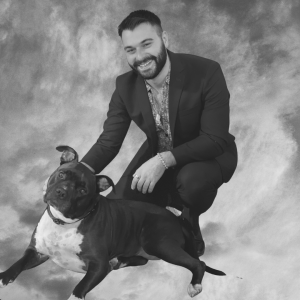
Sean Zucker
Sean Zucker is a writer whose work has been featured in Points In Case, The Daily Drunk, Posty, and WellWell. He has an adopted Pit Bull named Banshee whose work has been featured on the kitchen floor and whose behavioral issues rival his own.
Related articles
![A man holding a dog in a crowded space in Ukraine.]()
How You Can Help Ukraine’s Animals
These Ukrainian rescue organizations need our support. Here’s how to get it to them ASAP.
![Woman holding dogs at an animal shelter]()
10 Ways Animal Shelters Are Upping Their Game
New trends we can totally get behind.
![Stray dog sleeping on the street]()
Four Things to Do If You Want to Adopt a Dog From Another Country
Fall in love abroad? Follow these simple steps to bring your new family member home.
